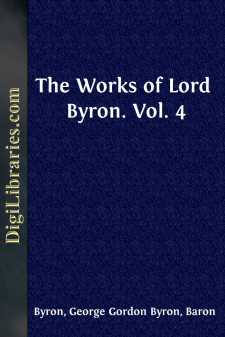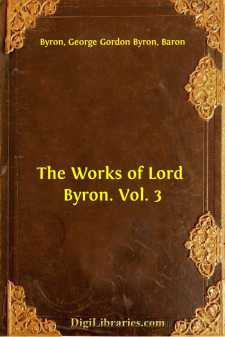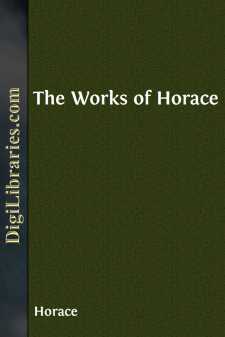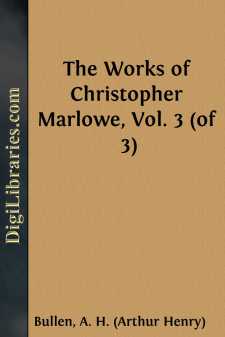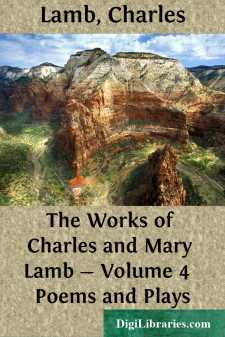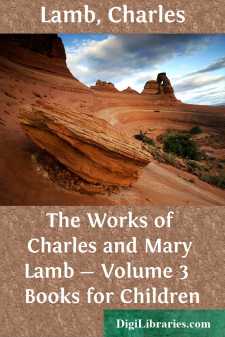Poetry Books
Sort by:
by:
Andrew Lang
BED IN SUMMER In winter I get up at night And dress by yellow candle-light. In summer, quite the other way,— I have to go to bed by day. I have to go to bed and see The birds still hopping on the tree, Or hear the grown-up people’s feet Still going past me in the street. And does it not seem hard to you, When all the sky is clear and blue, And I should like so much to play, To have to go to bed by...
more...
The source code for this HTML page contains only Latin-1 characters, but it directs the browser to display some special characters. The original work contained a few phrases or lines of Greek text. These are represented here as Greek letters, for example Οá¿âμοι. If the mouse is held still over such phrases, a transliteration in Beta-code pops up. Aside from Greek letters, the only...
more...
INTRODUCTION TO THE OCCASIONAL PIECES (POEMS 1809-1813; POEMS 1814-1816). The Poems afterwards entitled "Occasional Pieces," which were included in the several editions of the Collected Works issued by Murray, 1819-1831, numbered fifty-seven in all. They may be described as the aggregate of the shorter poems written between the years 1809-1818, which the author thought worthy of a permanent...
more...
INTRODUCTION TOTHE FIRST AND SECOND CANTOS OF CHILDE HAROLD. The First Canto of Childe Harold was begun at Janina, in Albania, October 31, 1809, and the Second Canto was finished at Smyrna, March 28, 1810. The dates were duly recorded on the MS.; but in none of the letters which Byron wrote to his mother and his friends from the East does he mention or allude to the composition or existence of such a...
more...
by:
Horace
THE FIRST BOOK OF THE ODES OF HORACE. ODE I. TO MAECENAS. Maecenas, descended from royal ancestors, O both my protection and my darling honor! There are those whom it delights to have collected Olympic dust in the chariot race; and [whom] the goal nicely avoided by the glowing wheels, and the noble palm, exalts, lords of the earth, to the gods. This man, if a crowd of the capricious Quirites strive to...
more...
HERO AND LEANDER. Two editions of Hero and Leander appeared in 1598. The first edition, containing only Marlowe's portion of the poem, is entitled Hero and Leander. By Christopher Marloe. London, Printed by Adam Islip, for Edward Blunt. 1598. 4to. The title-page of the second edition, which contains the complete poem, is Hero and Leander: Begun by Christopher Marloe; and finished by George...
more...
by:
Charles Lamb
INTRODUCTION The earliest poem in this volume bears the date 1794, when Lamb was nineteen, the latest 1834, the year of his death; so that it covers an even longer period of his life than Vol. I.—the "Miscellaneous Prose." The chronological order which was strictly observed in that volume has been only partly observed in the following pages—since it seemed better to keep the plays together...
more...
by:
Charles Lamb
THE TEMPEST (By Mary Lamb) There was a certain island in the sea, the only inhabitants of which were an old man, whose name was Prospero, and his daughter Miranda, a very beautiful young lady. She came to this island so young, that she had no memory of having seen any other human face than her father's. They lived in a cave or cell, made out of a rock: it was divided into several apartments, one...
more...
by:
Anonymous
"Pray, what would you like?" said a Toyman, one day,Addressing a group of young folks,"I have toys in abundance, and very cheap, too,Though not quite so cheap as my jokes."Here's a famous managerie, full of wild beasts;See! this lion with wide open jaws,Enough to affright one, and yet I've no doubt,You might venture to play with his claws."Here's a tiger as tame as a...
more...
1. How, my dear Mary,—are you critic-bitten (For vipers kill, though dead) by some review, That you condemn these verses I have written, Because they tell no story, false or true? What, though no mice are caught by a young kitten, _5 May it not leap and play as grown cats do, Till its claws come? Prithee, for this one time, Content thee with a visionary rhyme. 2. What hand would crush...
more...



